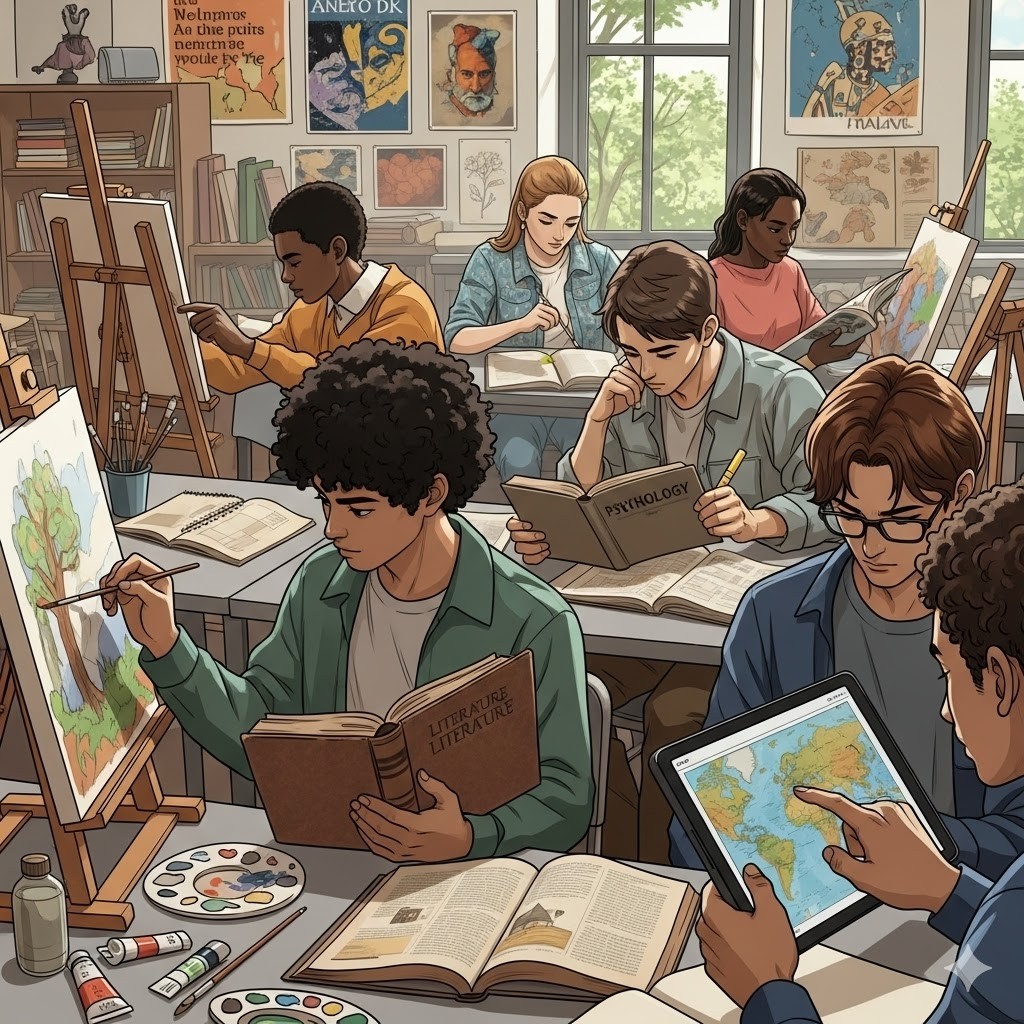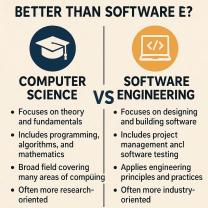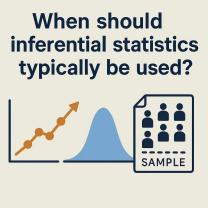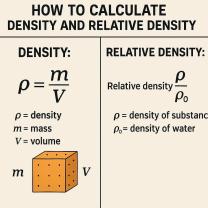Which are the best subjects in Arts stream?
The Arts stream often gets a reputation for being the "easy" path, but nothing could be further from the truth. In reality, it is a dynamic and essential academic stream, foundational for shaping individuals with highly sought-after skills:creativity, analytical thinking, and exceptional communication. Far from limiting options, the Arts stream empowers students to explore the vast tapestry of human experience, fostering deep cultural understanding and equipping them with versatile talents for a rapidly evolving world.
Unlike the STEM fields, the Arts stream thrives on inquiry, interpretation, and expression. It offers a diverse array of subjects that collectively work to develop critical thinking, cultivate creativity, and build a nuanced cultural understanding crucial for navigating complex social landscapes. From deciphering ancient texts to analyzing contemporary policies, Arts education challenges students to think deeply, question assumptions, and articulate their perspectives with clarity and conviction.
For students standing at the crossroads of academic choices, understanding the breadth and depth of the Arts stream is vital. This comprehensive guide will walk you through the most valuable subjects within this stream, explain how to choose them strategically based on your aspirations, and unveil the exciting career options they unlock. Whether your passion lies in storytelling, social justice, or understanding the human mind, the Arts stream offers a pathway to a fulfilling and impactful future.
Which Are the Best Subjects in the Arts Stream?
The "best" subjects are subjective, depending on individual interests and goals, but certain disciplines consistently stand out for their academic rigor, versatility, and career relevance. Here’s a look at some of the most popular and beneficial top arts subjects for students:
History: Explores past events, societies, and civilizations.
Teaches: Critical analysis of sources, research skills, understanding cause and effect, recognizing patterns, and developing a global perspective.
Value: Essential for understanding current geopolitical landscapes and preparing for roles in civil services, research, and journalism.
Political Science: Focuses on government, public policies, political behavior, and international relations.
Teaches: Analytical reasoning, understanding power dynamics, civic engagement, policy analysis, and persuasive communication.
Value: A cornerstone for careers in law, civil services, public administration, and international organizations.
Psychology: The scientific study of the human mind and behavior.
Teaches: Empathy, human understanding, research methodology, statistical analysis, and critical thinking about mental processes.
Value: Opens doors to counseling, human resources, market research, and understanding social dynamics.
Sociology: Examines human society, social behavior, patterns of social relationships, interaction, and culture.
Teaches: Critical analysis of social structures, understanding inequality, research methods, and diverse perspectives on societal issues.
Value: Highly relevant for social work, public policy, urban planning, and journalism.
Economics (often offered in Commerce, but also valuable in Arts): Studies how societies allocate scarce resources.
Teaches: Analytical reasoning, problem-solving, data interpretation, critical thinking about markets and policy, and quantitative skills.
Value: Excellent for careers in finance, business analysis, public policy, and even journalism (economic reporting).
English Literature: Involves the study of literary works, poetry, drama, and prose.
Teaches: Advanced communication, critical interpretation, creative thinking, nuanced argumentation, and cultural insight.
Value: Fundamental for journalism, content creation, teaching, law, and any profession requiring strong written communication.
Fine Arts (e.g., Painting, Sculpture, Music, Dance, Theatre): Focuses on creative expression and aesthetic appreciation.
Teaches: Creativity, self-expression, discipline, cultural understanding, performance skills, and visual/aural literacy.
Value: Direct path to careers in design, performing arts, arts administration, and creative industries.
Remember, the subject combinations you choose can significantly influence university admissions and future career specializations. For example, combining History and Political Science is strong for law, while English Literature and Psychology can be powerful for media and communication roles.
How Do You Choose the Right Arts Subjects for Your Career Goals?
Choosing the right arts stream subjects for career success requires introspection, strategic planning, and practical research. This isn't just about picking what sounds interesting; it's about aligning your academic path with your long-term professional aspirations.
1. Align Subjects with Long-Term Goals
Think about the careers that excite you and work backward.
Aspiring Journalist? English Literature and Political Science will equip you with strong writing, analytical skills, and an understanding of current affairs.
Aiming for Civil Services (UPSC)? History, Political Science, Sociology, and Public Administration form a robust foundation, providing a comprehensive understanding of governance and society.
Interested in Human Resources or Counseling? Psychology, combined with Sociology, offers deep insights into human behavior and group dynamics.
Dreaming of Design or Advertising? Fine Arts and English Literature can hone your creative vision and communication skills.
2. Assess Interests, Academic Strengths, and Professional Aspirations
Interests: What subjects genuinely fascinate you? You'll excel more when you're passionate about what you're learning.
Academic Strengths: Where do you naturally perform well? While challenging yourself is good, choosing subjects where you have a foundational aptitude can ease the academic load.
Professional Aspirations: Research potential job roles. What skills do they require? Which subjects will best build those skills?
3. Seek Guidance and Conduct Research
Guidance Counselors: Your school's counselor can provide personalized advice, understanding your profile and suggesting suitable combinations.
Aptitude Tests: These can offer insights into your innate strengths and interests, suggesting career fields you might thrive in.
Research: Look up university admission requirements for your desired undergraduate degrees. Speak to professionals in fields you're considering. What did they study? How did their Arts background help them?
Making an informed decision now will set a strong trajectory for your future success.
What Skills Can You Develop Through Arts Education?
One of the most compelling arguments for the Arts stream is the unparalleled development of a wide range of both soft and hard skills. These are not just academic competencies but highly transferable attributes valued across every industry.
Key Skills Developed:
Communication: Through essay writing, presentations, and debates, Arts students master the art of articulating complex ideas clearly and persuasively, both orally and in writing.
Creativity: From interpreting literature to conceptualizing artistic projects, Arts education fosters imaginative thinking and innovative problem-solving.
Critical Analysis: Evaluating sources, dissecting arguments, and understanding nuanced perspectives are central to all Arts subjects, sharpening your analytical prowess.
Empathy & Human Understanding: Subjects like Psychology, Sociology, and Literature build a profound understanding of diverse human experiences, cultures, and motivations.
Problem-Solving: Analyzing historical dilemmas, political conflicts, or psychological case studies equips students with versatile problem-solving frameworks.
Research Skills: Locating, evaluating, and synthesizing information from various sources is a core competency, from basic library research to advanced academic inquiry.
Interdisciplinary Thinking: Arts subjects often overlap, encouraging students to connect ideas across different fields (e.g., the economics of historical events, the psychology of political movements).
Real-World Applications:
Creative Writing Skills in Marketing: Crafting compelling ad copy, social media content, or brand narratives.
Psychology Insights in HR: Understanding employee motivation, team dynamics, and conflict resolution.
Historical Analysis in Policy Making: Learning from past governance failures and successes to inform future policies.
Sociological Perspectives in Urban Planning: Designing inclusive and equitable communities.
Ultimately, Arts education doesn't just impart knowledge; it enhances both emotional intelligence and intellectual versatility, making graduates adaptable and insightful contributors to any professional environment.
How Do Arts Subjects Prepare Students for Higher Education?
Universities around the world highly value Arts students for the unique foundation they bring to higher education. The Arts stream builds a robust intellectual toolkit that is indispensable for a wide array of undergraduate and postgraduate degrees.
Foundation for Diverse Degrees:
Law: Arts subjects, particularly Political Science, History, and English Literature, cultivate the rigorous analytical, argumentative, and research skills essential for legal studies.
Journalism & Mass Communication: English Literature and Political Science provide strong writing abilities, critical thinking about media, and an understanding of current events.
Psychology & Social Work: Built directly on the foundational knowledge gained in high school Arts subjects.
Design & Fine Arts: Direct progression from arts subjects, fostering creative talent and aesthetic understanding.
Education: Understanding human development, social structures, and communication is vital for aspiring educators, making subjects like Psychology and Sociology invaluable.
International Relations & Public Policy: History, Political Science, and Economics offer critical insights into global affairs and governance.
Transferable Skills Valued by Universities:
Academic Writing: The extensive essay writing in Arts subjects hones the ability to construct well-supported arguments, synthesize information, and write coherently—a skill critical for all university courses.
Argument Construction: Arts students learn to develop and defend a thesis, a core requirement for university-level research and debate.
Interdisciplinary Learning: Arts education encourages students to draw connections between different fields, preparing them for the complex, interdisciplinary nature of many university programs.
Broad Worldview & Analytical Depth: Universities appreciate Arts graduates for their ability to approach problems from multiple perspectives, their cultural sensitivity, and their capacity for deep, critical analysis—qualities that enrich any academic environment.
What Are Popular Career Paths for Arts Stream Students?
The flexibility and transferable skills gained in the Arts stream debunk the myth of limited career options. In fact,popular arts careers span a vast spectrum, adapting well to traditional and emerging industries alike.
Top Career Options:
Civil Services: Many top-ranking officers in government administration (IAS, IPS, etc.) come from Arts backgrounds due to the emphasis on history, political science, and public policy.
Law: A natural progression for those with strong analytical and communication skills, leading to roles as lawyers, legal advisors, and judges.
Journalism & Media: Reporters, editors, broadcasters, content creators, and media analysts benefit from strong writing, research, and critical thinking skills.
Teaching & Academia: Arts graduates are well-equipped to educate future generations in schools and universities across a variety of subjects.
Design: Graphic designers, UX/UI designers, interior designers, and fashion designers leverage creative and aesthetic talents (often after specialized courses).
Psychology & Counseling: Clinical psychologists, counselors, and organizational psychologists help individuals and groups understand and navigate complex emotions and behaviors.
Social Work & NGOs: Working directly with communities, advocating for social justice, and implementing development programs.
Marketing & Advertising: Copywriters, brand strategists, market researchers, and public relations specialists use persuasive communication and understanding of human behavior.
Public Policy & Research: Analyzing social issues, advising governments, and conducting research for think tanks.
Emerging Roles:
The digital age has opened new doors for Arts graduates:
Content Strategist: Crafting engaging content across various digital platforms.
UX Writer: Designing intuitive and user-friendly language for digital products.
Cultural Researcher: Analyzing trends and behaviors for brands, media, and academic institutions.
Art Curator/Archivist: Managing and preserving cultural heritage in museums and galleries.
The inherent adaptability of Arts education allows graduates to thrive in the constantly evolving landscape of digital media, communication, and human-centric roles.
Career Pathway Table
| Subject | Related Undergraduate Degree | Potential Careers |
| Political Science | Public Administration | Civil Services, Policy Analyst, Lobbyist, Diplomat |
| Psychology | Counseling | Clinical Psychologist, HR Specialist, Market Researcher |
| English Literature | Media & Communication | Journalist, Copywriter, Content Creator, Editor, Teacher |
| History | Archaeology | Archivist, Museum Curator, Historian, Civil Services |
| Sociology | Social Work | Social Worker, Urban Planner, Community Development Officer |
| Economics | Business Analytics | Economist, Financial Analyst, Consultant, Market Analyst |
| Fine Arts | Graphic Design | Graphic Designer, Illustrator, Art Director, Animator |
FAQ Section
Q1: Is Arts a good stream for future career growth?
Absolutely. The Arts stream develops highly transferable skills like critical thinking, communication, problem-solving, and adaptability, which are increasingly valued in the modern workforce. While specific job titles might differ from STEM, Arts graduates find successful careers in diverse fields from civil services to digital media.
Q2: Which subjects in Arts are best for UPSC or government exams?
For UPSC and other government exams, core Arts subjects like History, Political Science, Public Administration, Sociology, and Economics are highly beneficial. They provide a strong foundation for the general studies papers and offer excellent optional subjects for the mains examination.
Q3: Can Arts students switch to management or business later?
Yes, many Arts students successfully transition into management or business fields. An Arts background provides strong soft skills, critical thinking, and communication abilities that are highly advantageous in an MBA program or business roles. Many BBA or MBA programs accept graduates from any stream.
Q4: Which Arts subjects are best for creative careers like design or writing?
For creative careers,English Literature is excellent for developing writing, storytelling, and critical interpretation skills.Fine Arts (including visual arts, performing arts, and design principles) is a direct path for design-oriented roles. Combining these can create a powerful foundation for careers in content creation, advertising, UX writing, and graphic design.
Conclusion
The Arts stream is an exceptional choice for students who deeply value creativity, culture, and human understanding. It’s a pathway for those who seek to understand the complexities of society, express profound ideas, and analyze the nuances of human experience. Far from being a lesser option, it is a robust educational journey that cultivates a unique set of intellectual and emotional strengths.
There is no single "best" subject; the most effective choice always depends on your personal interests, individual strengths, and specific career aspirations. Whether you are drawn to the rigor of history, the insights of psychology, the eloquence of literature, or the beauty of fine arts, each subject offers a unique lens through which to view and engage with the world.
We encourage all students to boldly explore the diverse opportunities within the Arts stream, to align their passions with meaningful academic pursuits, and to envision the impactful career opportunities that await them. An Arts education doesn't just prepare you for a job; it prepares you for a life of critical engagement, creative expression, and profound understanding.












StudentMotivation
on October 12, 2025A brilliant, motivational piece! It encourages students to align their passions with meaningful career opportunities instead of following the crowd.
GuidanceNeeded
on October 12, 2025The tip to consult with guidance counselors and research university requirements is practical. Strategic choices are key to success. #TopArtsSubjectsForStudents